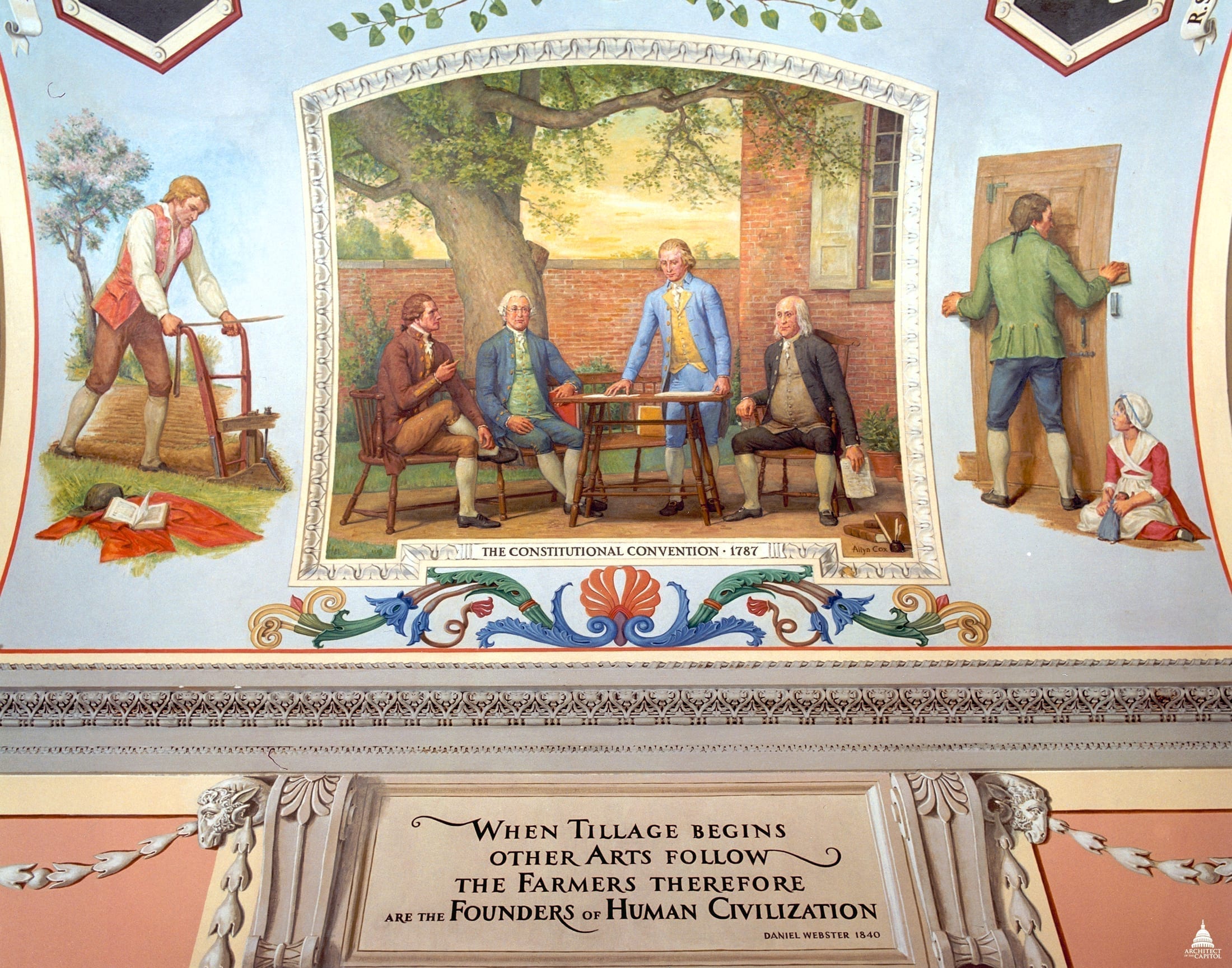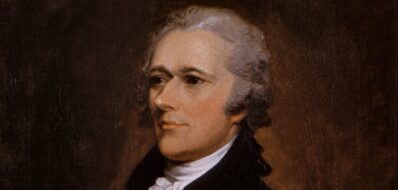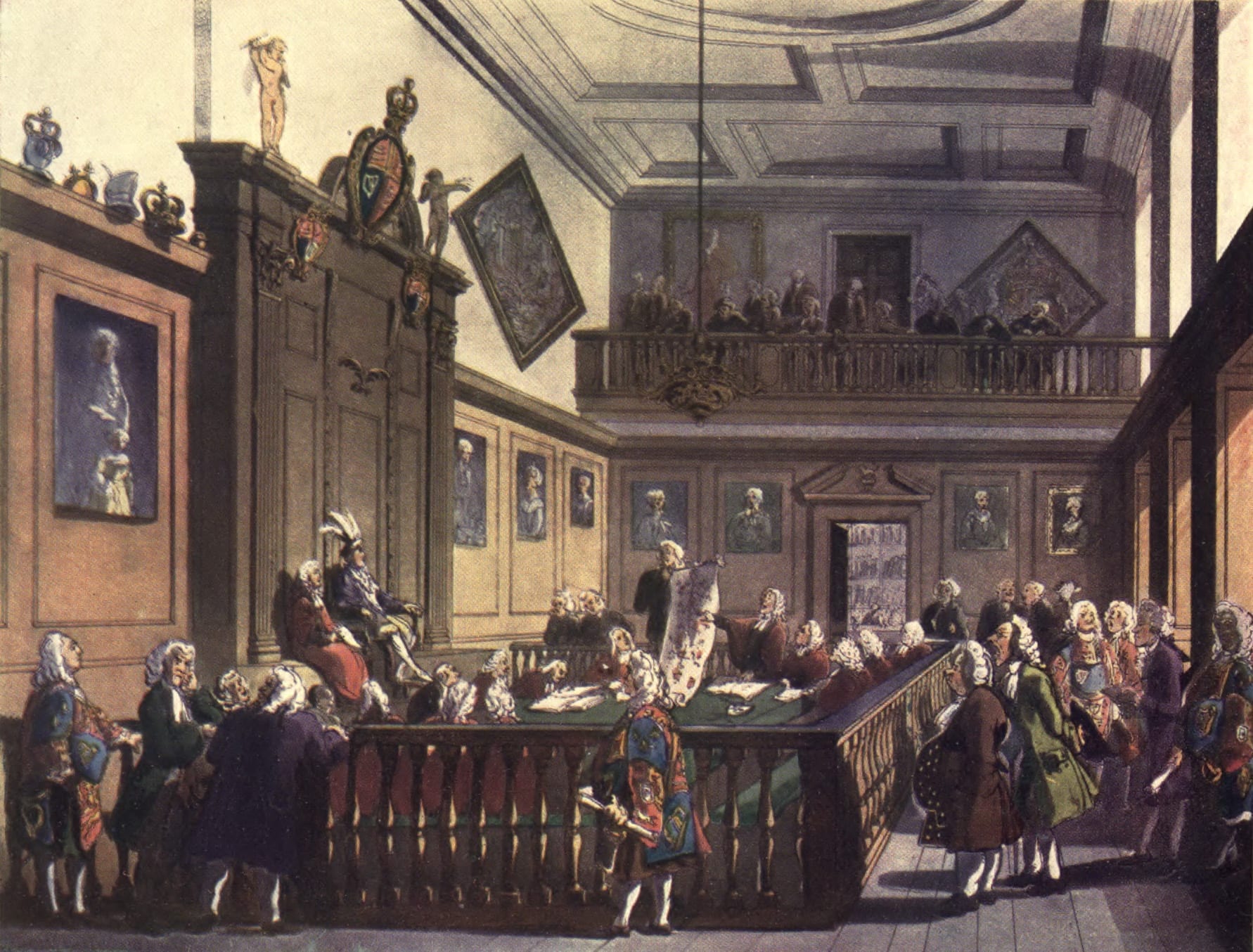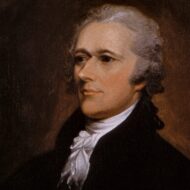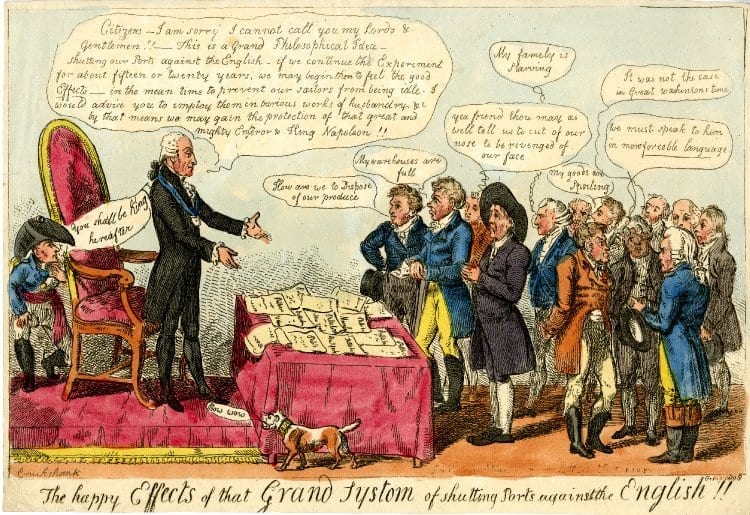


- Speech on Abolition Petitions
- Speech on the Oregon Bill
- Speech on the Repeal if the Missouri Compromise
- Dred Scott v. Sandford
Introduction
As churches began to struggle over the issue of slavery (See “Minutes of the General Assembly, Presbyterian Church in the United States of America” 1818)), so did the federal government. A sectional crisis arose in the United States over the future status of slavery in the federal territory acquired with the purchase of the Louisiana Territory from France in 1803. Open threats to dissolve the Union were freely made, especially after Representative James Tallmadge Jr. (1778–1853), a Democratic-Republican from New York and a veteran of the War of 1812, attached a controversial antislavery amendment to the bill for Missouri statehood. Known as the “Tallmadge Amendment,” it sought to prohibit the influx of any more slaves into Missouri and further required that all offspring born to slaves after statehood would be freed at twenty-five years of age. Tallmadge’s floor speech in support of the amendment was widely circulated and republished by antislavery forces, who shared his abhorrence of slavery and his desire to prohibit its future expansion. The amendment narrowly passed the House of Representatives, but was promptly rejected by the U.S. Senate.
Tallmadge’s speech raises many of the issues, especially federal authority over the territories and the status of slavery at the Founding, that the country would debate for the next 40 years. It is worth noting Tallmadge’s remark that it would be an insult to the House to assume that any member would argue that slavery was a good thing morally or politically. Tallmadge was here reflecting the view held generally from the Founding, both north and south, that slavery was an unfortunate necessity. This was a view that the Missouri crisis called into question among southerners. In response to the arguments of those like Tallmadge, southerners began to express the view that slavery was not an evil but a good thing (See John C. Calhoun’s “Speech on the Abolition Petitions” (1837)).
Source: Annals of Congress, House of Representatives, 15th Congress, 2nd Session, 1203–14, https://memory.loc.gov/cgi-bin/ampage?collId=llac&fileName=033/llac033. db&recNum=599.
Mr. Tallmadge, of New York, rose. Sir, said he, it has been my desire and my intention to avoid any debate on the present painful and unpleasant subject. When I had the honor to submit to this House the amendment now under consideration, I accompanied it with a declaration, that it was intended to confine its operation to the newly acquired territory across the Mississippi; and I then expressly declared that I would in no manner intermeddle with the slaveholding states, nor attempt manumission in any one of the original states in the Union. Sir, I even went further, and stated that I was aware of the delicacy of the subject, and that I had learned from Southern gentlemen the difficulties and the dangers of having free blacks intermingling with slaves; and, on that account, and with view to the safety of the white population of the adjoining states, I would not even advocate the prohibition of slavery in the Alabama Territory;[1] because, surrounded as it was by slaveholding states, and with only imaginary lines of division, the intercourse between slaves and free blacks could not be prevented, and a servile war might be the result. While we deprecate and mourn over the evil of slavery, humanity and good morals require us to wish its abolition, under circumstances, consistent with the safety of the white population. Willingly, therefore, will I submit to an evil which we cannot safely remedy. I admitted all that had been said of the danger of having free blacks visible to slaves, and therefore did not hesitate to pledge myself that I would neither advise nor attempt coercive manumission. But, sir, all these reasons cease when we cross the banks of the Mississippi, a newly acquired territory, never contemplated in the formation of our government, not included within the compromise or mutual pledge in the adoption of our Constitution, a new territory acquired by our common fund, and ought justly to be subject to our common legislation. . . .
Sir, the honorable gentleman from Missouri, (Mr. Scott,)[2] who has just resumed his seat, has told us of the Ides of March, and has cautioned us to “beware the fate of Caesar and of Rome.” Another gentleman, (Mr. Cobb)[3] from Georgia, in addition to other expressions of great warmth, has said, “that, if we persist, the Union will be dissolved;” and, with a look fixed on me, has told us, “we have kindled a fire which all the waters of the ocean cannot put out, which seas of blood can only extinguish.” . . .
Sir, if a dissolution of the Union must take place, let it be so! If civil war, which gentlemen so much threaten, must come, I can only say, let it come! My hold on life is probably as frail as that of any man who now hears me; but, while that hold lasts, it shall be devoted to the service of my country—to the freedom of man. If blood is necessary to extinguish any fire which I have assisted to kindle, I can assure gentlemen, while I regret the necessity, I shall not forbear to contribute my mite. Sir, the violence to which gentlemen have resorted on this subject will not move my purpose, nor drive me from my place. I have the fortune and the honor to stand here as the representative of freemen, who possess intelligence to know their rights, who have the spirit to maintain them. Whatever might be my own private sentiments on this subject, standing here as the representative of others, no choice is left me. I know the will of my constituents, and, regardless of consequence, I will avow it; as their representative, I will proclaim their hatred to slavery in every shape; as their representative, here will I hold my stand, until this floor, with the Constitution of my country which supports it, shall sink beneath me. If I am doomed to fall, I shall at least have the painful consolation to believe that I fall, as a fragment, in the ruins of my country. . . .
Sir, has it already come to this; that in the Congress of the United States . . . the subject of slavery has become a subject of so much feeling—of such delicacy, of such danger, that it cannot safely be discussed? . . . Are we to be told of the dissolution of the Union; of civil war, and of seas of blood? And yet, with such awful threatenings before us, do gentlemen, in the same breath, insist upon the encouragement of this evil; upon the extensions of this monstrous scourge of the human race? An evil so fraught with such dire calamities to us as individuals, and to our nation, and threatening, in its progress, to overwhelm the civil and religious institutions of the country, with the liberties of the nation, ought at once to be met, and to be controlled. If its power, its influence, and its impending dangers have already arrived at such a point that it is not safe to discuss it on this floor, and it cannot now pass under consideration as a proper subject for general legislation, what will be the result when it is spread through your widely extended domain? Its present threatening aspect, and the violence of its supporters so far from inducing me to yield to its progress, prompts me to resist its march. Now is the time. It must now be met, and the extension of the evil must now be prevented, or the occasion is irrecoverably lost, and the evil can never be contracted. . . .
Sir, we have been told, with apparent confidence, that we have no right to annex conditions to a state on its admission into the Union; and it has been urged that the proposed amendment, prohibiting the further introduction of slavery is unconstitutional. This position, asserted with so much confidence, remains unsupported by any argument, or by any authority derived from the Constitution itself. The Constitution strongly indicates an opposite conclusion, and seems to contemplate a difference between the old and the new states. The practice of the government has sanctioned this difference in many respects.
The third section of the fourth article of the Constitution says, “new States may be admitted by the Congress into this Union,” and it is silent as to the terms and conditions upon which the new states may be so admitted. The fair inference from this silence is, that the Congress which might admit, should prescribe the time and the terms of such admission. The tenth section of the first article of the Constitution says, “the migration or importation of such persons as any of the States now existing shall think proper to admit, shall not be prohibited by the Congress prior to the year 1808.” The words “now existing” clearly show the distinction for which we contend. The word slaves is nowhere mentioned in the Constitution, but this section has always been considered as applicable to them, and unquestionably reserved the right to prohibit their importation into any new state before the year 1808.
Congress, therefore, have power over the subject, probably as a matter of legislation, but more certainly as a right, to prescribe the time and the condition upon which any new state may be admitted into the family of the Union. Sir, the bill now before us proves the correctness of my argument. It is filled with conditions and limitations. . . . And to all these amendments we have heard no objection; they have passed unanimously. But now, when an amendment prohibiting the further introduction of slavery is proposed, the whole House is put in agitation, and we are confidently told that it is unconstitutional to annex conditions on the admission of a new state into the Union. The result of all this is, that all amendments and conditions are proper, which suit a certain class of gentlemen, but whatever amendment is proposed, which does not comport with their interests or their views, is unconstitutional, and a flagrant violation of this sacred charter of our rights. In order to be consistent, gentlemen must go back and strike out the various amendments to which they have already agreed. The Constitution applies equally to all, or to none.
Sir, we have been told that this is a new principle for which we contend, never before adopted, or thought of. So far from this being correct, it is due to the memory of our ancestors to say, it is an old principle, adopted by them, as the policy of our country. Whenever the United States have had the right and the power, they have heretofore prevented the extension of slavery. The states of Kentucky and Tennessee were taken off from other states, and were admitted into the Union without condition, because their lands were never owned by the United States. The Territory Northwest of the Ohio is all the land which ever belonged to them. Shortly after the cession of those lands to the Union, Congress passed, in 1787, a compact[4] which was declared to be unalterable, the sixth article of which provides that “there shall be neither slavery nor involuntary servitude in the said territory, otherwise than in the punishment for crimes, whereof the party shall have been duly convicted.” In pursuance of this compact, all the states formed from that territory have been admitted into the Union upon various considerations, and among which the sixth article of this compact is included as one. . . .
Sir, we have been told that the proposed amendment cannot be received, because it is contrary to the treaty and cession of Louisiana. “Article 3. The inhabitants of the ceded territory shall be incorporated in the Union of the United States, and admitted as soon as possible, according to the principles of the Federal Constitution, the enjoyment of all the rights, advantages, and immunities of citizens of the United States; and, in the meantime, they shall be maintained and protected in the free enjoyment of their liberty, property, and the religion which they profess.” I find nothing in this article of the treaty, incompatible with the proposed amendment. The rights, advantages, and immunities of citizens of the United States are guaranteed to the inhabitants of Louisiana. If one of them should choose to remove into Virginia, he could take his slaves with him; but if he removes to Indiana, or any of the states northwest of the Ohio, he cannot take his slaves with him. If the proposed amendment prevails, the inhabitants of Louisiana or the citizens of the United States can neither of them take slaves into the State of Missouri. All, therefore, may enjoy equal privileges. . . .
Sir, in the course of the debate on this subject, we have been told that, from the long habit of the Southern and Western people, the possession of slaves has become necessary to them, and an essential requisite in their living. It has been urged, from the nature of the climate and soil of the Southern countries, that the lands cannot be occupied or cultivated without slaves. It has been said that the slaves prosper in those places, and that they are much better off there than in their own native country. We have even been told that, if we succeed, and prevent slavery across the Mississippi, we shall greatly lessen the value of property there, and shall retard, for a long series of years, the settlement of that country.
Sir, if the Western country cannot be settled without slaves, gladly would I prevent its settlement till time shall be no more. If this class of arguments is to prevail, it sets all morals at defiance, and we are called to legislate on the subject, as a matter of mere personal interest. If this is to be the case, repeal all your laws prohibiting the slave trade; throw open this traffic to the commercial states of the East; and, if it better the condition of these wretched beings, invite the dark population of benighted Africa to be translated to the shores of Republican America. But, sir, I will not cast upon this or upon that gentleman an imputation so ungracious as the conclusion to which their arguments would necessarily tend. I do not believe any gentleman on this floor could here advocate the slave trade, or maintain, in the abstract, the principles of slavery. I will not outrage the decorum, nor insult the dignity of this House, by attempting to argue in this place, as an abstract proposition, the moral right of slavery. How gladly would the “legitimates of Europe chuckle”[5] to find an American Congress in debate on such a question!
As an evil brought upon us without our own fault, before the formation of our government, and as one of the sins of that nation from which we have revolted,[6] we must of necessity legislate upon this subject. It is our business so to legislate, as never to encourage, but always to control this evil; and, while we strive to eradicate it, we ought to fix its limits, and render it subordinate to the safety of the white population, and the good order of civil society.
Sir, on this subject the eyes of Europe are turned upon you. You boast of the freedom of your Constitution and your laws; you have proclaimed, in the Declaration of Independence, “That all men are created equal; that they are endowed by their Creator with certain inalienable rights; that amongst these are life, liberty, and the pursuit of happiness;” and yet you have slaves in your country. The enemies of your government, and the legitimates of Europe, point to your inconsistencies, and blazon your supposed defects. If you allow slavery to pass into territories where you have the lawful power to exclude it, you will justly take upon yourself all the charges of inconsistency; but, confine it to the original slaveholding states, where you found it at the formation of your government, and you stand acquitted of all imputation. . . . Sir, there is yet another, and an important point of view in which this subject ought to be considered. We have been told by those who advocate the extension of slavery into the Missouri, that any attempt to control this legislation is a violation of that faith and mutual confidence upon which our Union was formed and our Constitution adopted. This argument might be considered plausible, if the restriction was attempted to be enforced against any of the slaveholding states, which had been a party in the adoption of the Constitution. But it can have no reference or application to a new district of country recently acquired, and never contemplated in the formation of the government, and not embraced in the mutual concessions and declared faith upon which the Constitution was adopted. The Constitution provides that the Representatives of the several states to this House shall be according to their numbers, including three-fifths of the slaves in the respective states. This[7] is an important benefit yielded to the slaveholding states, as one of the mutual sacrifices for the Union. On this subject, I consider the faith of the Union pledged, and I never would attempt coercive manumission in a slaveholding state.
But none of the causes which induced the sacrifice of this principle, and which now produce such an unequal representation of the free population of the country, exist as between us and the newly acquired territory across the Mississippi. That portion of country has no claims to such an unequal representation, unjust in its results upon the other states. Are the numerous slaves in extensive countries, which we may acquire by purchase, and admit as states into the Union, at once to be represented on this floor, under a clause of the Constitution, granted as a compromise and a benefit to the Southern states which had borne part in the Revolution? Such an extension of that clause in the Constitution would be unjust in its operations, unequal in its results, and a violation of its original intention. Abstract from the moral effects of slavery, its political consequence in the representation under this clause of the Constitution demonstrate the importance of the proposed amendment.
Sir, I shall bow in silence to the will of the majority, on whichever side it shall be expressed; yet I confidently hope that majority will be found on the side of an amendment, so replete with moral consequences, so pregnant with important political results.
- 1. The present state of Alabama was first a territory, from December 1817 to December 1819, when it was admitted to the Union as a state.
- 2. John Scott (1785–1861) was a delegate from the Missouri Territory.
- 3. Thomas W. Cobb (1784–1830) was a representative from Georgia.
- 4. The Northwest Ordinance. See Documents 8 and 10.
- 5. “Legitimates of Europe” refers to kings and other hereditary rulers.
- 6. Tallmadge refers to the false claim in Jefferson’s draft that slavery was forced on the then colonies by Great Britain.
- 7. Document 8.

Conversation-based seminars for collegial PD, one-day and multi-day seminars, graduate credit seminars (MA degree), online and in-person.






